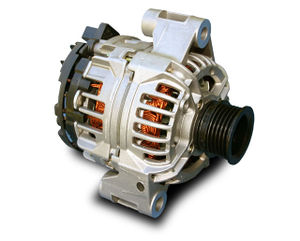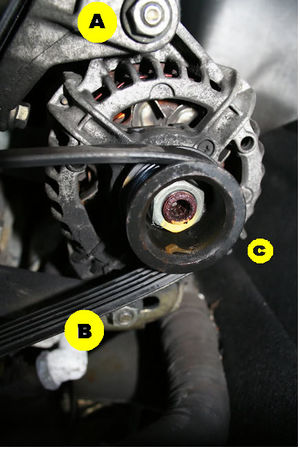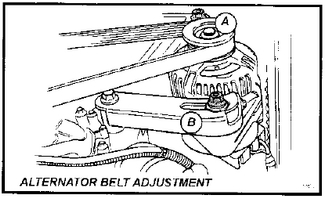Alternator
Alternator
Please add your Info, Just click EDIT
Alternator Problem Diagnosis
Common failures:
Regulator & Rectifier failure:
Battery lights flash on dash, headlights flash on when trying to start. When checking the voltage across the battery terminals readings are usually less then 12v, or can be open circuit and go high voltage 18v. This can have a detrimental affect on the battery - boils the acid/fluid if too high. Easiest solution - Remove the alternator and get checked by auto electrican.
The battery warning light on dash and flashing headlights can also be caused by a flat battery. There is a clicking as the solenoid etc click over but the engine will not start.
Bearing Failure for S2 111s and other model with 4-2-1 exhaust:
Due to the additional width of the 4-2-1 pipes, failure of the rear bearing is not uncommon. The heat from the pipes cooks the grease until the bearing runs dry and very loud. Noise produced sounds like metal grinding against metal.
Please add your Info, Just click EDIT
Alternator belt
You can change the alternator belt by taking off the rear drivers side wheel and plastic inner arch mud guard. Removing the undertray will give no advantage. You will just need a good socket set.
Loosen 'A' pivot bolt and 'B' tensioner bolt, to allow the alternator to 'swing'.
'C' on the diagram is the tensioner of the belt, loosen this to remove the belt. The tensioner bolt is the 8mm bolt on the end of the arm. It slots into the end of the arm and allows the adjustment. Difficult to see when peering in, but easy enough to locate.
The MG Rover part number for a belt for the S1 is PQS100840 and costs about £10.50 including VAT.
Tension belt to the following on S2: For heater cars - one way deflection of 6-8mm under moderate finger pressure For AC cars - as previous but 9-10mm
Removal of Alternator This is same as above but in addition you need to remove the 2No. cables; one is bolted on to the rear of the alternator using a 13mm nut, the other is a clip-on connector. Before removing the nut and cables, disconnect the battery.
Please add your Info, Just click EDIT
Alternator Heat Protection
Heat-shield fabrics claim to reflect up to 90% of the heat radiated by the exhaust and can function at temperatures unto 2000 degrees Fahrenheit.
The potential downside is that the critical components are also thermally insulated from the inside and could therefore suffer from internally generated heat, ie too much protection could make matter worse.
http://www.eliseparts.com/shop/index.php?main_page=product_info&products_id=289 http://www.elise-shop.com/index.php?main_page=product_info&products_id=80
Material can be bought here :- http://www.merlinmotorsport.co.uk/advanced_search_result.php?keywords=heat
There are option to improve the standard of the existing manifold sheilding or to wrap the exhaust. Both of which may just push the heat elsewhere and cause problems further down the line.
Please add your Info, Just click EDIT
Sourcing Replacement
It is not recommended to purchase Chinese manufactured pattern replacement alternators for the Elise, such as those commonly advertised on ebay. They are not built to withstand sustained high revs and are guaranteed to fail prematurely. These include:
- Unipoint (ALT-4212)
Known good models include:
- Magneti Marelli (63321239)
- Bosch - OE part


